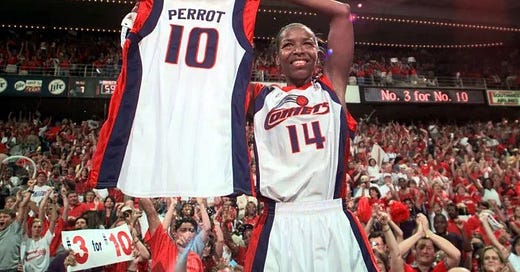25 years after her passing, Kim Perrot's legacy persists in the WNBA
The former Houston Comet left a lasting impact on the league and remains a legendary story of persistence and grace in women's basketball.
“When you die, that does not mean that you lose to cancer. You beat cancer by how you live, why you live and in the manner in which you live.
So, live. Live. Fight like hell. And when you get too tired to fight then lay down and rest and let somebody else fight for you.” - Stuart Scott.
Those words were spoken…
Keep reading with a 7-day free trial
Subscribe to No Cap Space WBB to keep reading this post and get 7 days of free access to the full post archives.




